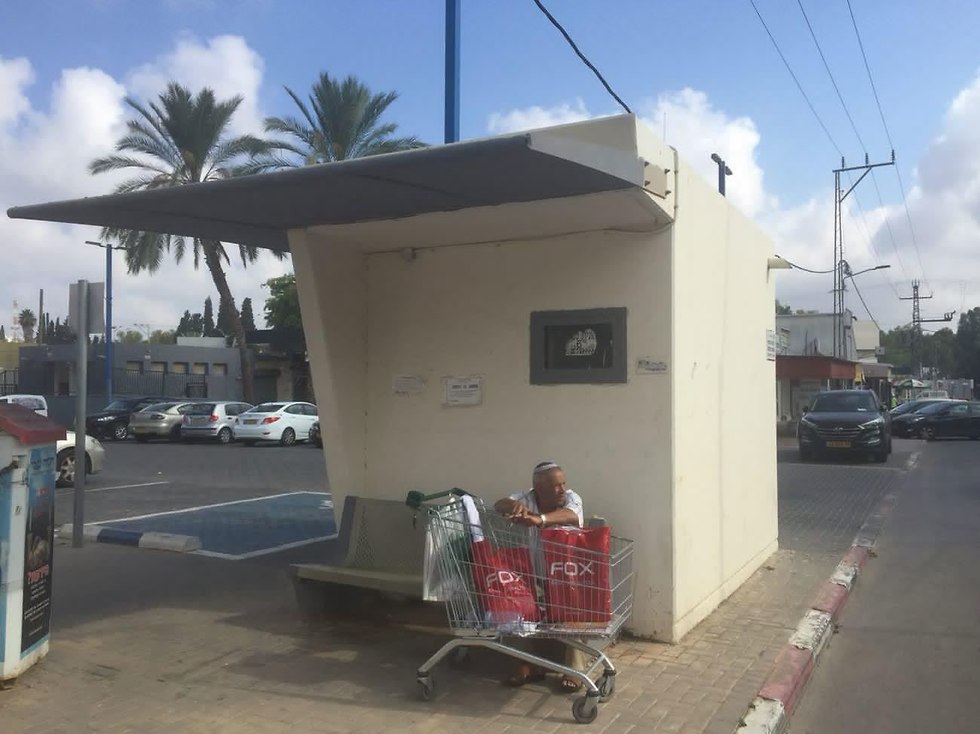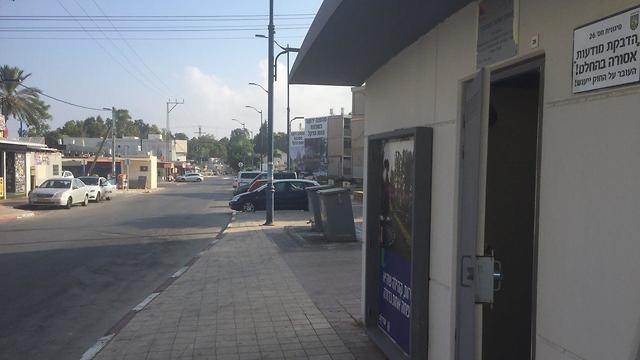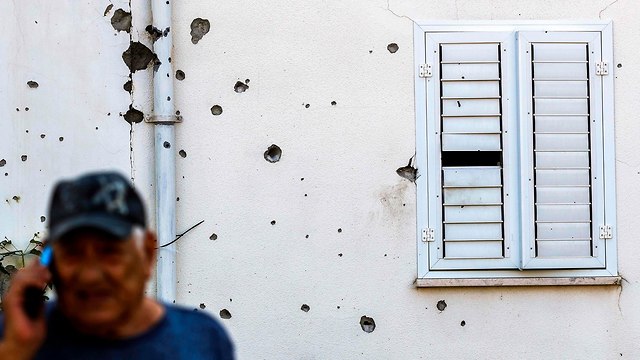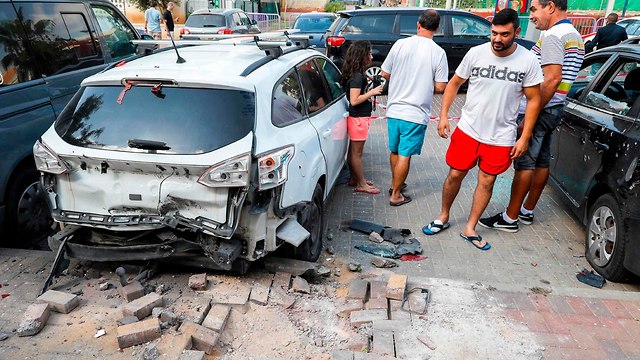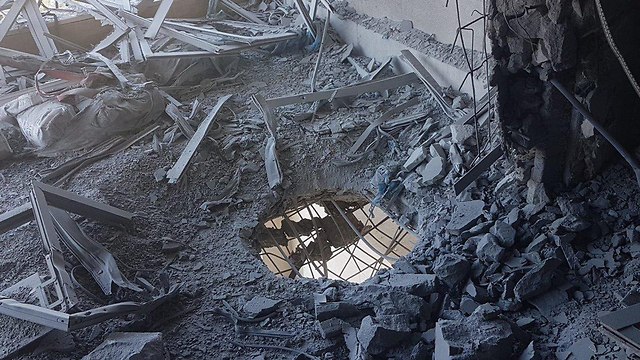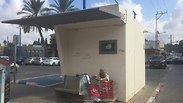
Sderot residents vent over limbo on Gaza border
As residents of city hardest hit by rockets fired from Hamas-ruled strip are forced to scurry to bomb shelters multiple times in latest round of violence in past two days, frustration mounts over 'no quiet and no war' impasse hit by government; 'If the IDF decides to hit the strip, we can take it,' says resident.
The old industrial zone of Sderot is usually bustling with shoppers on Friday, but was almost entirely empty on Friday morning, a day after the massive bombardment on Israeli southern cities.
According to the handful of buyers and merchants in the area, the unpredictability and fluctuation between the area being a center of shoppers and an almost completely deserted ghost town has become the norm—a phenomenon they say returned since Code Red sirens began blasting out on a regular basis.
“The parking lot here is always full. There’s no where to park. Now there are practically no people,” said Pasquel, a resident of one of the hardest-hit cities by Gaza attacks.
The latest ceasefire between Israel and the Hamas terror group, which was reported to have gone into effect at 10:45pm on Thursday evening, was cause for little optimism for Pasquel.
“This ceasefire is limited and I don’t have confidence in it. We have an enemy which exploits its innocent population there for its own benefit,” he said. "I expect our decision makers to approach the border and see the monument dedicated to the fallen paratroopers,” he told Ynet.
“There are sacrifices in every campaign, but this situation cannot be left in limbo, in which there is no quiet and no war. There should either be peace or we should formulate a policy and implement it,” the frustrated resident continued.
Asher Cohen, who has lived in Sderot for the past 40 years, said he cannot understand why the government is not taking stronger action against Hamas.
“It was a tough night, but it is still tense from our point of view. We sleep in bomb shelters. In the past four months we have lived in an on-and-off situation, with no knowing what will be tomorrow, or when the next Qassam rocket will come,” he complained.
“I am disappointed with our government. We feel like class D citizens. Every time we hear threats that we will expand our attacks and we ask: ‘Why not now?’ We want quiet and it can be brought about,” Cohen added.
“The government is limp. We would have expected there not to be a ceasefire at the moment and that we continue with a powerful response. Hamas can’t determine for us when there is calm and when there isn’t.”
Cohen is not alone in the voices calling for permanent quiet on the border instead of temporary ceasefires.
“Yes, there is quiet now, but let’s see how long it goes on for,” said a gloomy Alex Valochnikov, who has lived in Sderot for ten years. “I don’t believe in these declarations anymore. The residents are used to them, they understand that this is the situation and this is how it is going to stay.”
According to Valochnikov, a “serious operation” is needed “to put an end to this, to ensure continued quiet for the long term, not just for a year.”
For Albert Azran, who has 16 grandchildren, the main problem lies in the government’s decision making.
“The residents are used to how to act when there are sirens. Our problem is that the government should know how to hit them (Hamas) as they should, not the other way around. Hamas can rocket us today and tomorrow declare a ceasefire, but it’s all a bluff. There are no ceasefires. There’s nothing,” he said.
“We are a strong people and we know how to deal with it. I expect the government to first of all to reach an agreement on returning those in captivity, It should not be the last thing in negotiations, but rather the first. We, the residents, can stand in any situation. If the IDF decides to hit the strip, we can take it.”
A source in Gaza confirmed that a ceasefire went into effect to Ynet, while two Israeli officials denied a truce had been reached, in line with Israel's policy of ambiguity.
An Israeli official said Hamas has been asking for a ceasefire since Thursday morning, but the IDF continued attacking significant targets.
Hamas' Al-Aqsa TV channel reported late Thursday that a ceasefire has taken hold "on the basis of mutual calm." It said the deal was mediated by Egypt and other regional players.
A senior Hamas official, speaking on condition of anonymity because he was not authorized to speak to the media, said the deal would formally go into effect at midnight.
He said the agreement merely ends the latest two-day burst of violence between Israel and Hamas and added that Egypt would continue efforts to broker a long-term cease-fire.
Sderot Mayor Alon Davidi said Friday that the reported ceasefire is a mistake.
“I understand the desire of the government to enter into negotiations, but Israel must end the terror with military assistance. This on and off war is unhealthy,” Davidi said.
Over 180 rockets have been fired from Gaza over the past 24 hours, with the IDF retaliating with heavy bombardments in the strip, destroying a 5-story building, as well as several terror tunnels, military complexes and other targets.
At least seven Israelis were wounded from the Gaza rockets, with one landing as far as Be'er Sheva. Mortar shells and rockets also hit the entrance of a residential home in Sderot, a house in Hof Ashkelon Regional Council and a building in an industrial zone of the Sha'ar HaNegev Regional Council. The Iron Dome intercepted at least 30 rockets.
Palestinian officials said at least three people were killed in the Israeli attacks: Hamas fighter Ali Ghandour, 23-year-old Enas Khamash, who was pregnant, and her 18-month-old daughter Bayan. At least five civilians were wounded. Gaza's Health Ministry said the militant and the civilians were killed in separate incidents.










